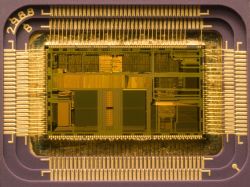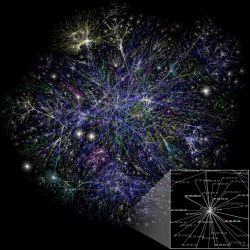Une révolution des méthodes de production
Modèle:Navigate-First-Overview-fr

Prémisses technologiques...
Chaque année, la puissance des appareils tels que les ordinateurs de bureau et les téléphones portables continue d'augmenter suivant la loi de Moore qui prédit que le nombre de transistor présents sur un circuit intégré doublerait tous les deux ans. Les utilisateurs détiennent donc le pouvoir de manipuler de plus en plus de données, de plus en plus vite. Aujourd'hui, un simple ordinateur peut permettre de faire du traitement de texte, de naviguer sur Internet, mais aussi de concevoir des plans détaillés de maisons, ou de circuits électroniques, ou encore la production de longs-métrages ; les possibilités sont seulement limitées par les logiciels utilisés et votre capacité à les maîtriser. Le libre-accès à des logiciels libres correctement documentés est donc très important.
Les origines d'Internet reposent sur un projet du département de la Défense des Etats-Unis, qui connectait plusieurs universités. Aujourd'hui, Internet est un réseau d'envergure mondiale, lui-même la somme de réseaux plus petits maintenus par diverses entités, telles que les Fournisseurs d'Accès à Internet. Tous ces réseaux mineurs sont reliés entre eux grâce à la lingua franca des réseaux informatiques : le protocle TCP/IP. Alors qu'il n'était utilisé dans sa jeunesse que pour l'e-mail ou le transfert de fichiers, Internet pris son envol avec l'invention du World Wide Web en 1989. Il était désormais possible de créer des pages mises en forme, et de les reliers via des hyperliens, et de les chercher grâce à des moteurs de recherche. Internet ressemble donc au final au réseau routier. C'est une infrastructure accessible à tous, mise en place par la Société dans son ensemble, bien que les bouts la composant appartiennent (du moins en partie) à des acteurs privés. Personne n'a un contrôle total sur Internet, et son financement est indépendant de sa fonction.

...for a Revolution in the Making
- A computer in every home.
- Every computer connected through a global network to every other computer.
What sounds so simple and has become almost ubiquitous in the more developed countries, is actually the setup for a revolution. These technologies enable individuals to do more for and by themselves, alone, or in loose collaboration with others.[1] How else could we explain the emergence of a situation where teenagers, sharing music over the Internet, are superior to the distribution channels of the recording industry? A situation where an online encyclopedia which every internet user can edit has become a serious competitor to the Encyclopedia Britannica in less than four years? A world in which nine out of ten computer users obtain the software to operate their machines from one single company, and in which at the same time a scene of enthusiast develop an alternative operating system which performs superior, and make it freely available to anybody?[2]
People all over the world try to use the new technologies to organize all human knowledge in a way which is both more efficient and more just. This development is transforming our society in fundamental ways. The very structures of how we communicated and how our economies worked for almost two centuries are changing.[3] Some established industries are becoming largely irrelevant and are being superseded by these new mechanisms which generally favour nonmarket production and individuals rather than a strong corporate world.[4] The industry is fighting these emerging mechanisms now and tries to use law and technology against them.[5] If they succeed in overpowering this digital revolution and use technology to control individuals rather than empower them, the revolution's many positive effects will be undone and transformed into their exact opposite. So a new kind of civil rights movement has arisen to defend the digital rights of individuals - rights that they often don't even know exist and that have backgrounds they yet have to be familiarised with.[6]
This Text
The case of software represents the most advanced example for application of these networked production mechanisms. Many later ideas in other domains have built upon the principles and philosophies developed by the free and open source software pioneers. That's why the story of the free software movement, the emergence of open source and the developments of GNU and Linux are described separately, in the first part of this text.
The second part consist of a short history of copyright, its implications on culture and the change of its scope with the emergence of digital technology. Networked information technology enables an entirely new economic model, making use of commons owned information and collaborating individuals, rather than large industries relying on exclusive rights, making information scarce against its nonrival nature, to produce many copies of the same homogenous information like the mass media did. Further-on, the implications of these developments on individuals and society as a whole are discussed.
The short third part lists what is needed for this networked information society to thrive and concludes with the statement that we are facing a choice today of whether to allow these mechanisms to flourish or squash them in favour of the old model of information production.
References
- ↑ Benkler, Yochai; The Wealth of Networks: How Social Production Transforms Markets and Freedom, 2006, p. 9
- ↑ Spiegel, André; Die Befreiung der Information: GNU, Linux und die Folgen, 2006 (German), p. 7
- ↑ Benkler, p. 1
- ↑ Benkler, p. 3
- ↑ Lawrence Lessig, Free Culture : How Big Media Uses Technology and the Law to Lock Down Culture and Control Creativity, 2004
- ↑ Spiegel, p. 8